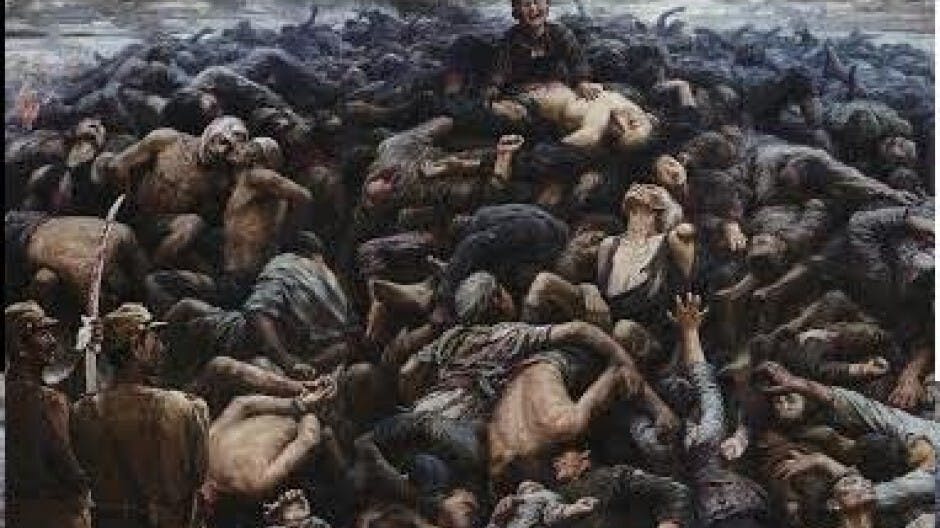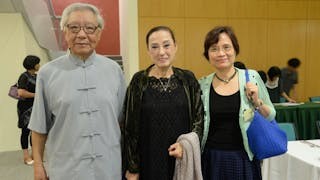〈宏澟烈江山〉——調寄滿江紅
鐵膽橫戈,銅琴戚,招魂調澀。存浩氣,
百年英烈,捨身折戟。
拳亂屈降圖革命,命懸抗戰長堪憶。
盧溝陷,火海拼淞魂,屍橫積。
金陵恨,莊戰激,湘桂血,心肝瀝。
甫擎杯祝捷,自殘殤逼。
幾代沈淪崩社稷,一朝得位誰珍惜。
劍隨築,宏澟烈江山,沈橋擊。
英詩痛悼南京英靈
1941年香港淪陷未幾,先父陳慶先生與家母梁梅鳯女士自澳門輟學,奔韶關入桂林,分別獻身飛虎隊後勤及前線軍護工作,共赴國難。幼承庭訓,深悉民族苦難;至入學認字,涉獵《財叔》等抗日連環圖,乃矢志為國效命。茲逢抗戰勝利七十周年,宿夜匪懈,為拙作英詩集《一九三七南京祭》Mass For Nanking’s 1937(Washington:New Academia Publishing)反覆斟字酌句,期趕及9月呈之予3000多萬英靈,以彰悼念。余於序言沈重道謝:
In the months marking the 70th anniversary on the end of the Second World War…
To my grandparents, parents and senior relatives/friends who had experienced with unlimited and life-long human pain through one of the bloodiest periods of the twentieth century,
To my teachers, siblings, family, peers and students who, from time to time, have shared their bitterness and joy, pain and passion with me over a passage of life encountering with cross-oceanic and cross-strata contrast and balance, so as conflict and compromise,
To Grace Cavalieri, David McAleavey and A.B. Spellman, Anna Lawton, brothers and sisters,
who have helped make this book available to the public,
To Mr. Li Zhi-jian whose kind permission for letting me use his remarkable art work Nanjing Massacre for my book cover and Joan Wong whose professional art work on the book-cover design,
I am sentimentally indebted.
(A Passionate Message in Chinese)
〈山河熱血濃〉——調寄沁園春
七七盧溝,刁鬥沙風,戴月疾衝。
薊北刀光颯,攔腰劈殺,鬼神驚煞,土赤泥紅。
八一三魂,四行倉庫,旗正飄飄敵愾同。
金陵恨,懦夫遺弱女,倭獸殘兇。
江山半壁城空,浩氣燕歌夷狄動容。
嗣台兒莊捷,出湘入蜀,流亡千里,扶老攜童。
瀝膽長沙,仁安薑役,還我山河熱血濃。
盟軍識,芷江英雄劍,銘鑄青龍。

摯友美國前任國家藝術基金會US National Endowment for the Arts副主席A.B. Spellman諍言力薦,余益感愧歉激勵!
“Grateful to Wing-Chi Chan’s Confrontation For The 1937 Rape of Nanking”
The 1937 rape of Nanking by the Japanese Imperial army is one of those historical events which defy linguistic modifiers; “tragedy” or “atrocity” do not approach the sadistic nihilism, the scale and scope, the wanton intensity of the horror. The cold anonymity of the atomic bombing of Hiroshima and Nagasaki might be the flip side of such inhumation, but there is something so massively perverse, so hands-on about the Nanking horror that makes us wonder what kind of species we are part of.
Wing-Chi Chan’s poetic eulogy, Mass For Nanking’s 1937, is a courageous attempt to bring our senses to the charnel sensuality of the event. He applies his musician’s ear to the words his eye calls forth. Any such protracted monstrous event could only be imagined with a certain surreal dissonance, and that is what Wing-Chi has drafted for us. The poem moves from a calm and rational conception to an appropriately grotesque wildness. By the end of the first section to the poem’s end, his words join together in a logic only those dark places in our subconscious that we seldom peek into can parse. It asks, how does one face what one cannot bear to see? But face these things we must if we are to excise them from human behavior. I am grateful to Wing-Chi Chan for the confrontation.
(B. Spellman, Poet & Witness to Jazz, former Deputy Chairman, U.S. National Endowment for the Arts)
盡心鑽研民族歌曲
《樂書》:「審音知政。」百年來晚清文化西潮以還,透過教堂,租界由外國人創辦的「上海公共管樂隊」、軍樂、學堂、音樂社團、歌舞劇團、夜總會、電影和唱片製作、羣眾組織、救亡組織與軍宣組織來引進西方樂法(作曲、記譜、樂器、演奏法)創作各類中國歌曲;余窮四十五年來致力於研究之,蒐集各類歌曲錄音,省覽從晚清、民國至中共各期不同的國歌,引用西方樂法所創作的學堂歌、各期藝術歌曲、羣眾歌曲、流行歌曲、經改編的民歌,以及政治宣傳歌曲之流變,其歌詞與音樂體裁風格形成及發展,在在反照中華民族情愛夢幻,血涙歌泣的劫難滄桑——敢有歌吟動地哀,銘心刻骨史詩情!

Paul Robeson(American bass singer):義勇軍進行曲
松花江上(張寒暉作於1936年)
流亡三部曲(抗日歌曲)
大刀進行曲(麥新(原名孫培元)作於1937年8月8日)
畢業歌(聶耳曲)
新節慶合唱團、逢友合唱團、知音合唱團:旗正飄飄(黃自曲)
長城謠(劉雪庵曲)
抗敵歌(原名抗日歌)
杜鵑花(黃友棣曲)
故鄉(陸華柏曲,張帆詞)
辛瑞芳:白雲故鄉
岳彩輪:嘉陵江上(賀綠汀曲)
伍伯就:保衛中華(何安東曲)
八百壯士
壯志凌霄(中華民國空軍軍歌,葉逸凡詞,劉雪庵曲)
葛朝祉:保衛領空
郭淑珍:黃河怨
國軍首度將〈黃河大合唱〉搬上舞台
黃河大合唱
黃河大合唱(八樂章全本)

圖片:作者提供













































